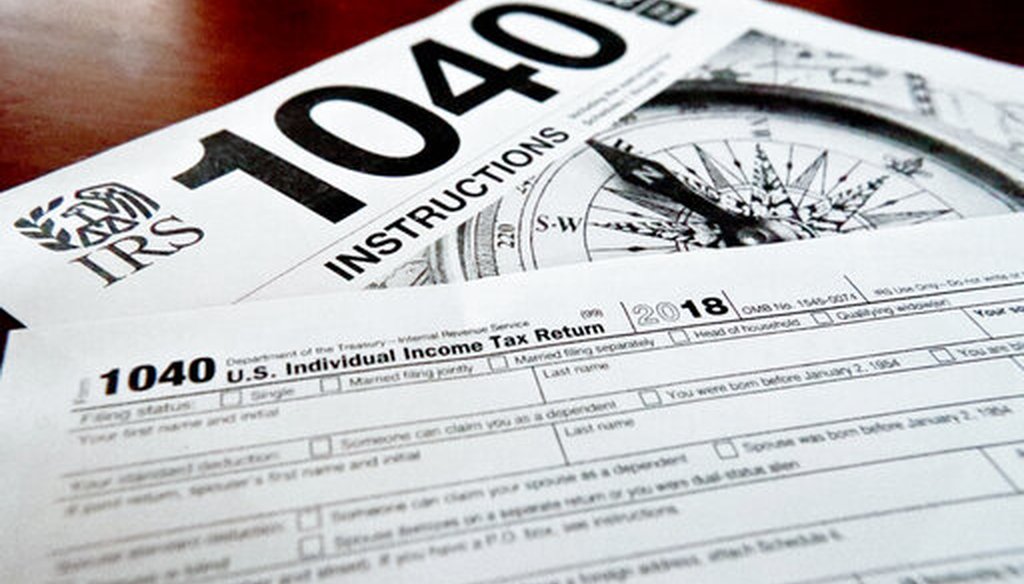

Our only agenda is to publish the truth so you can be an informed participant in democracy.
We need your help.


(AP)
Johnson angled for a tax break for pass-through companies (businesses that pass income onto their owners, and are not subject to corporate income tax) before he’d vote yes on the 2017 Tax Cuts and Jobs Act, which ultimately passed.
Analyses from the Joint Committee on Taxation and the National Bureau of Economic Research have found that ultra-wealthy Americans have received billions in tax savings stemming from that deduction, while those earning less have gotten less of a break.
The general election for one of Wisconsin’s U.S. Senate seats may still be months away, but Democrats have been gearing up to defeat Ron Johnson for much longer.
Johnson, an Oshkosh Republican and Wisconsin’s senior senator, has held the seat since 2011. Earlier this year, he announced he’d break with his initial pledge to only serve two terms and run for a third.
In a news release, the Democratic Party of Wisconsin honed in on an action Johnson took at the beginning of his second term: He withheld his yes vote on the 2017 Tax Cuts and Jobs Act unless the bill included a tax break for companies called "pass-throughs" — those that pass all their income on to the owners or investors. Companies structured this way (often small, family owned businesses) are not subject to corporate income tax.
And it worked. Once that tax break was added, Johnson voted yes and the bill passed.
But Wisconsin Democrats argue it wasn’t those small, family-owned businesses that reaped the bulk of the benefits.
"Multiple independent studies found that the tax carve out Johnson spearheaded overwhelmingly benefited the wealthiest, over small businesses," the April 29, 2022, release said.
Is that correct? Let’s break it down.
When asked to back up the claim, Philip Shulman, Senate communications advisor for the Democratic Party of Wisconsin, sent a list of analyses of the tax law from news outlets and research organizations.
We’ll start with an April 2021 study from Treasury economists for the National Bureau of Economic Research. The study found that the top 1% of Americans by income have received nearly 60% of the tax savings created by the provision. Most of that amount went to the top 0.1%.
That’s because even though there are many American small businesses that also function as pass-throughs, most pass-through profits flow to the wealthy owners of a small group of large companies, according to an Aug. 11, 2021, ProPublica analysis of the tax law.
That small group of the ultrawealthy — made up of Republicans like Dick and Liz Uihlein, whose shipping supply company Uline is headquartered in Wisconsin, and Democrats like former presidential candidate Michael Bloomberg — received close to $25 billion in total tax savings in 2018 as a result of the pass-through tax break benefits, according to the National Bureau of Economic Research study.
The rest of the top 10% of Americans by income received a little over $12 billion in total, and everyone else in the country, about $6 billion.
An April 23, 2018, congressional report forecast the same breakdown. In 2018, the Joint Committee on Taxation estimated that roughly 53% of the pass-through deduction benefit, or about $21 billion, would go to a few hundred thousand Americans earning $500,000 or more a year.
For comparison, the average salary for an American small business owner is about $61,000 per year, according to the salary comparison company Payscale.
By 2024, just under $4 billion of the pass-through deduction benefit would go to Americans making less than $100,000 per year, according to the Joint Committee on Taxation Report. More than $31 billion would go to those making over a million dollars a year.
To be sure, any broad-based tax cut will mostly benefit the wealthy because they already pay a large share of income taxes, something Johnson has acknowledged.
In an April 28, 2022, interview with CBS 58-TV, Johnson said his efforts were "for the many, not the few" because most businesses function as pass-throughs, and that "when you start talking about taxation, if you cut taxes for everybody … people who make more money get more dollars cut, but that’s our tax system."
The Democratic Party of Wisconsin claimed that the pass-through tax break Johnson advocated for in 2017 "overwhelmingly benefited the wealthiest, over small businesses."
Multiple analyses show America’s millionaires and billionaires are receiving large chunks of those benefits.
We rate their claim True.
PolitiFact Wisconsin, "Johnson benefited from tax cut, but it's not a loophole," April 27, 2022
ProPublica, "Secret IRS files reveal how much the ultrawealthy gained by shaping Trump’s ‘big, beautiful tax cut,’" Aug. 11, 2021
National Bureau of Economic Research, "How do business owners respond to a tax cut? Examining the 199A deduction for pass-through firms," April 2021
ProPublica, "Secret IRS files reveal how much the ultrawealthy gained by shaping Trump’s ‘Big, beautiful tax cut,’" Aug. 11, 2021
Joint Committee on Taxation, "Tables related to the federal tax system as in effect 2017 through 2026," April 24, 2018
NBC News, "Special Trump tax provision gives $17 billion break to millionaires, gov’t report finds," April 23, 2018
Payscale, Average small business owner salary, updated May 9, 2022
CBS 58, "Sen. Ron Johnson defends tax cuts that benefited his plastics company," April 18, 2022
Brookings Institution, "9 facts about pass-through businesses," May 15, 2017
Vox, "Trump said this tax break was for small businesses. It’s giving $17 billion to millionaires this year," April 24, 2018
The Washington Post Fact-Checker, "Trump aides sell tax plan with Pinocchio-laden claims," Sept. 29, 2017
In a world of wild talk and fake news, help us stand up for the facts.
